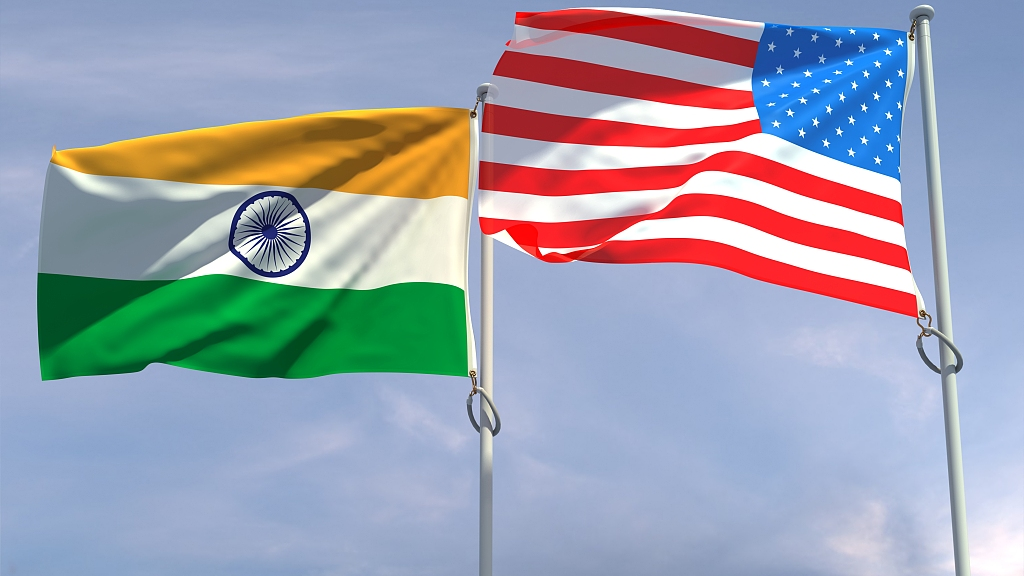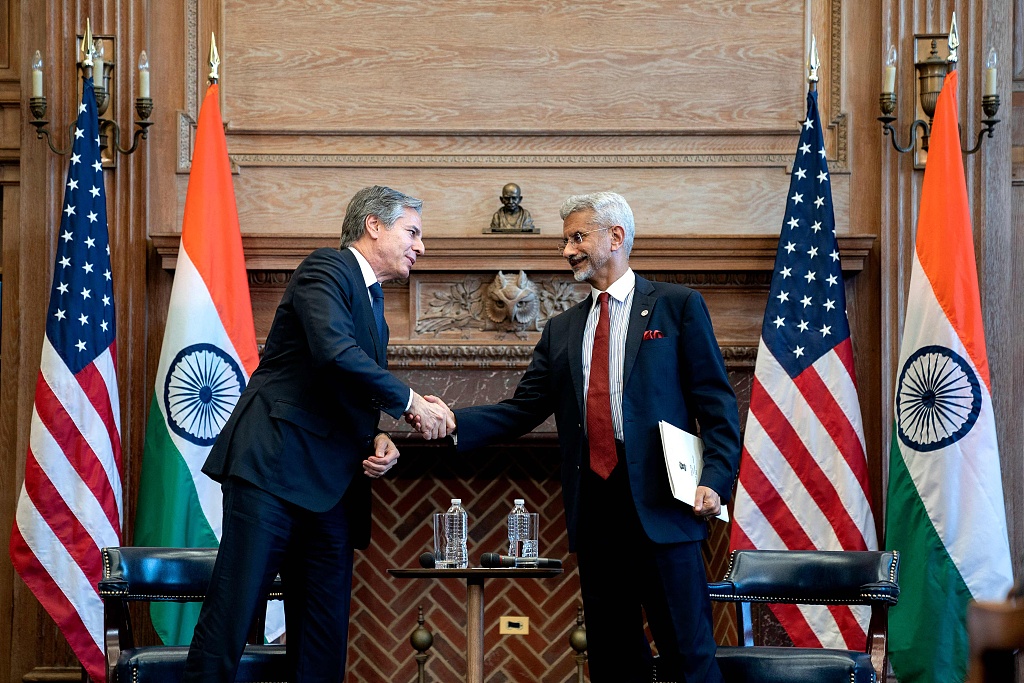
National flags of India and the U.S. /CFP
National flags of India and the U.S. /CFP
Editor's note: Madhav Nalapat is Vice-Chair of Manipal Advanced Research Group. The article reflects the author's opinions and not necessarily the views of CGTN.
While the 19th century saw the domination of Europe across much of the world, the 20th saw the primacy of the U.S., especially after the collapse of the Soviet Union in 1991. The 21st century is the Asian century, with the geopolitical center of gravity shifting to the Indo-Pacific from the Atlantic. U.S. President Joe Biden, National Security Advisor Jake Sullivan and Secretary of State Antony Blinken seem obsessed about Russia.
All three were eager that Prime Minister Narendra Modi bases policy not on the verities of the present, but the past. The fact is that the U.S., UK and EU have made a historic blunder over Ukraine.
The entire globe is feeling the harmful impact of the "unprecedented" sanctions that have been placed on Russia after its special military operation of Ukraine. Financial sanctions, including on individuals who are no longer Russian citizens, are causing a lack of confidence in the euro, U.S. dollar, UK pound and Swiss franc as safe currencies to hold reserves and savings in.
Global supply chains for food, fertilizer and myriad other commodities have been disrupted by the sanctions that have so carelessly and hastily been imposed in the belief that their severity would cause Russia to reverse course in a few weeks, if not days.
Instead, it has stiffened the resolve of Moscow to continue its special military operations in Ukraine until the objectives are met.
Leaders of NATO are lecturing India, a country of around 1.4 billion people not to buy in a month quantities of Russian oil that are less than two hours of purchases of the same by NATO members themselves.
Threats of sanctions from Washington and Brussels have been met in New Delhi with the contempt they merit. Thanks to the spike in oil prices (which benefit oil producers in North America and in parts of Europe) and the discounted prices being offered to India by Russia, which is necessary for India to purchase as much oil and gas from Russia as is logistically feasible. Such purchases would damp down inflationary pressures while boosting economic growth in India.
The good news is that U.S. President Joe Biden seems to have understood that India does not react well to pressure from the West, an entity that inflicted cruel control over the subcontinent for two centuries and drained it of prosperity for their selfish benefit.
During 1941-45, former UK Prime Minister Winston Churchill diverted ships with Indian food grain from the starving population of Bihar and Bengal to Britain, causing more than several million deaths.

U.S. Secretary of State Antony Blinken shakes hands with Indian External Affairs Minister Dr. S. Jaishankar following a U.S.-India higher education dialogue at the Howard University Founders Library in Washington, D.C., April 12, 2022. /CFP
U.S. Secretary of State Antony Blinken shakes hands with Indian External Affairs Minister Dr. S. Jaishankar following a U.S.-India higher education dialogue at the Howard University Founders Library in Washington, D.C., April 12, 2022. /CFP
This man-made famine has yet to be classified by the UN as what it was, a genocide. During the 1990s, when India was much weaker financially, Prime Minister Narasimha Rao rebuffed pressure from the U.S. and West Europe to hand over what territory was preserved during 1947-48 in Kashmir to Pakistan, and to abandon India's space and nuclear programs.
To expect a much stronger India in 2022 to bend to Western pressure and abandon its 70-year friendship with Russia is to misunderstand not just the people of India but the leader they have since 2014 chosen through the ballot box, Narendra Modi, the present Prime Minister of India.
Fortunately for Indo-U.S. relations, there are many 21st century minds that appreciate the importance of India to global security within the Biden administration, just as there are a few who seek to poison relations between Washington and New Delhi.
To appease this toxic lobby within the Democratic Party, senior U.S. officials sometimes make noises about "human rights violations" in India, forgetting that in contrast to some of its neighbors, minorities in India have not shrunk but grown.
They are proud and full participants in the country's onward growth trajectory. Such realists prevailed on the "West is Best" preachers in the Biden administration to ensure that the April 11 dialogue between President Biden and Prime Minister Modi, and the 2+2 dialogue between the Foreign and Defence Ministers went smoothly.
The good news is that the top leaders and their ministers focused on the need of the nearly 1.8 billion people in the U.S. and India to ensure that Washington and New Delhi became the closest of security partners in the 21st century instead of forcing India to do what the West wanted from Russia.
(If you want to contribute and have specific expertise, please contact us at opinions@cgtn.com. Follow @thouse_opinions on Twitter to discover the latest commentaries on CGTN Opinion Section.)

